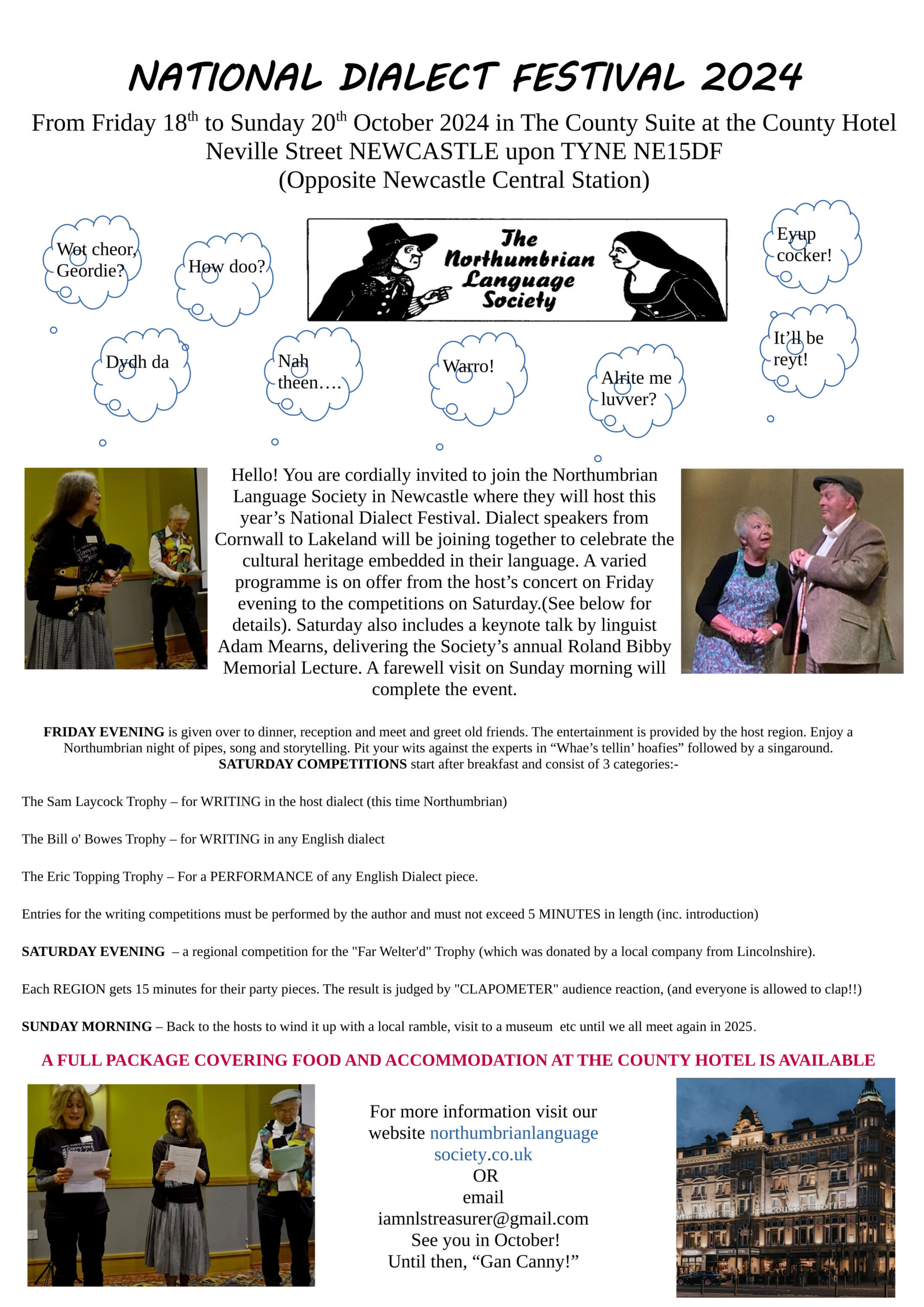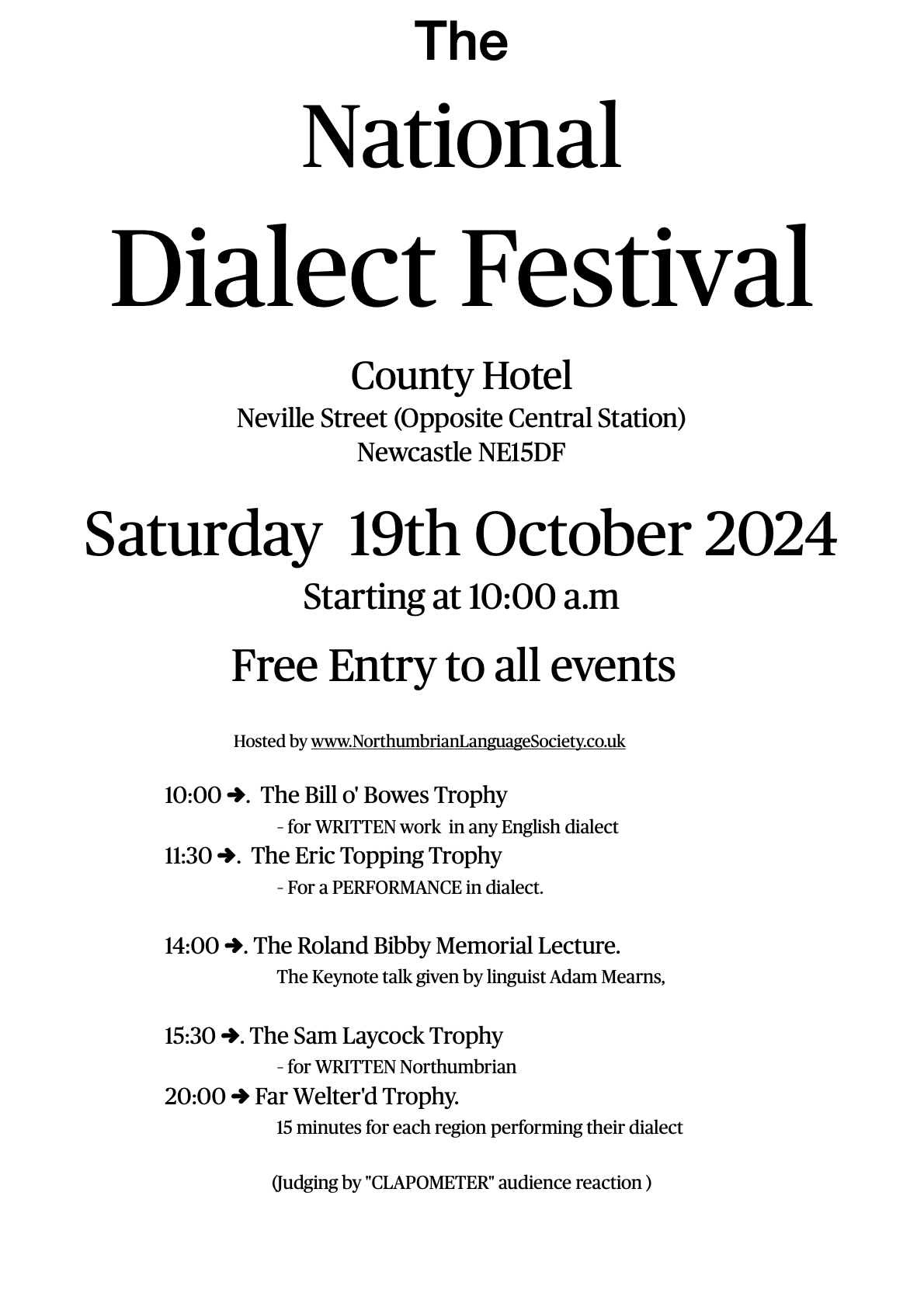Northumbrians, the real ones, not the ‘moved in lately’ ones, are proud of their accent, and proud of their language. Yes, Language. It has it’s own words, it’s own vocabulary of words that do not exist in ‘Standard’ English. It has a history of it’s own, older than the English it lives beside.
Northumbrian evolved over ages. 449 AD is the year generally assigned to the arrival of English. Powerful tribes of Angles, Saxons, and Jutes. The Angles spread int the midlands, and North of the Humber, and here we stay. Gildas, in 564, wrote the first english word, and it’s a word that still has a special meaning to a Northumbrian. When we say ‘keel’ we mean an entire vessel, whereas in English ‘keel’ refers only to a part of a ship. Gildas wrote “Then a litter of cubs,” (that is his name for the English), “issuing forth from the lair of the lioness of Beornicas, in three cyuls, as it is expressed in their tongue, in ours, long ships.”
Try saying ‘cyul‘ the way it was spelled in 564, and you’ve started speaking with a Northumbrian accent.
Examples of the earliest Northanhumbrian dialect is in the Lindisfarne Gospels, the Rushworth Gospels, and in the Durham Ritual.
The Norman Conquest brought more imported language, until by the end of the fifteenth century Midland dialect asserted itself as the sole dialect of literature. Previously, English had been written in three dialects. In the early period, these were Northumbrian, Mercian, and Wessex
Thereafter, the dialect and sub-dialects of the North were practically set aside for five hundred years. They have developed , like all language, but outside Standard English. From our remote corner and its comparative isolation from external influences we kept a dialect with characteristics which are in many respects unique.
As recently as stage-coach days dialect-speech was common to everyone across the social strata. Our vocabulary is remarkable for its comprehensiveness. It includes archaisms which describe the minor moralities of life, the niceties of conduct, care of the person, and behaviour in society. All these indicate a true refinement, which finds a fuller expression in the social virtues included in such terms as bonny and canny and hinny.
When Victoria was on the throne the first efforts to understand and appreciate our dialect and accent were being made, in our own Lit & Phil in Newcastle. Researches into where subtleties of dialect were spoken suggested four main branches – North and South, West Tyneside, and County Durham. The major feature of our accent that distinguishes us from others is the rolling Northumbrian burr. That melliflous sound of the ‘r’ that can still be heard when you tread the Cheviots
Introduction to pronunciation
Outsiders persist in stating that a Northumberland man is unable to pronounce the letter r. Attempts to imitate it are generally made with this misconception and are ridiculous to native ears. The burr is given with a full aspiration, and is really an emphatic and exaggerated r. The attempt of the Scots lass who rendered it by “swallowing the words and giving them a bit chew as they went down,” would be unsuccessful. The Scottish r is produced by a true trill of the tip of the tongue. The burr is effected by using the base and not the tip of the tongue.
Yet the burr is relatively recent, around the beginning of the fifteenth century, a tradition exists that the Northumberland burr began as a personal defect of Hotspur, and was then imitated by his companions and by the earldom as a whole.
When we find thirst, curse and purse pronounced thorst, kors and pors and words like birth and mirth and skirt pronounced borth, morth and skort (with many more examples), it is the sound of the Middle English period that has been retained because it is the least effort to use the burr. Compare the feeble result of pronuncing Otter-burn with the genuine sound when it is spoken by us as Ottor-born.
The best known cataloger of Northumbrian is Richard Oliver Heslop, who published 2 volumes of Northumbrian words and definitions in 1892. Sections are reproduced elsewhere on the site, but for now it’s sufficient to mention that he recognised different areas of the county according to their dialect and pronunciations, designating the places thus:
N (here Nth Nd) the district north of the River coquet including Redesdale
S (here Sth N’d) south or central Northumberland, including the part of the county south of the river Coquet and lying between that line and the eastern portion of the Tyne valley
T (here Tyne) Tyneside, with Newcastle as its centre, including the valley of the Tyne and both its banks from Wylam to the sea, and a portion of the northern part of Co. Durham
W-T (here Hex) – West Tyne, the district west of Wylam, having Hexham as its centre
Examples
All across N’Land you will hear
aa, a’, aall (Sth N’d, Tyne) – all: “it’s aa ower”
but there is a difference in the way we say
afoor (Nth N’d), afor (Tyne) – before: “gan on afore”
and see how ‘coal’ varies in accent
kwoal (Sth N’d), kwol (Nth N’d) – the pronunciatin of coal
kwoat (Hex), kwot (Nth N’d) – coat
something you might say to the boyfriend ? Take care to use the correct pronunciation if you’re in Hexham or Wooler
yal / yaul / yald (hex), yauld, yeld, yawl (Nth N’d) – active, powerful, nimble: “a yawl horse”, “man, yo’r a yald un!”
One more example of our unique words
Cats are always popular, but we have plenty of variation on the topic of cats
cat – a piece of soft clay, moulded to be thrust between laths before being plastered
cat – a ball made by mixing coal and clay together. The Crow-coal in the extreme south-west and around Alston burns with a foetid smell, so cats are used in domestic hearths.
cat – a piece of wood used in the boys game of kitty-cat.
cat-band – an iron band for securing cover of a hatch in a keel,
cat-built – applied to an old style of shipbuilding, with a narrow stern, and much tumblehome
cat-choup – a hip e.g. wild rosehip
cat-haa – hawthorn berry,
cat-heed – an ironstone nodule
cat-pease – The fruit of the vetch.
cat-whin – burnet gorse
More cats in Northumberland than you can shake a stick at.
Share this content


